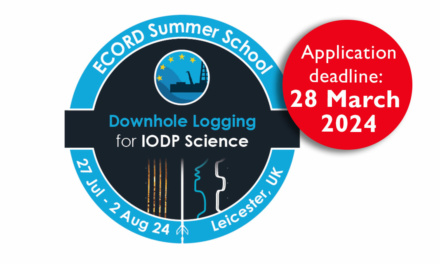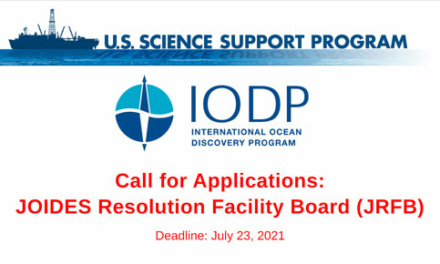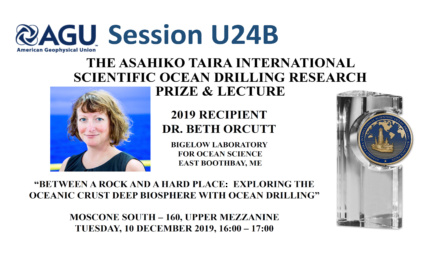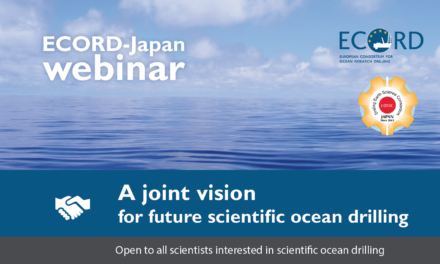JOIDES Resolution Facility Board, 26 February 2021
Dear IODP Community,
I am briefly following up on my 5 January 2021 letter to you to make a couple of clarifications and a request of everyone.
It would appear there is some confusion about submission of proposals that would use the JR. Beginning with the 1 April 2021 deadline, we will not be accepting any new proposals addressing the current Science Plan. There are exceptions that were noted in my earlier letter, such as the new Land-2-Sea proposals, as well as those proposals reviewed by the SEP in 2020 that were deactivated but where the proponents were encouraged to re-submit. Revisions to proposals already in the system and Ancillary Project Letters will be also be accepted. I need to clearly explain why this action has been taken. Basically, we do not want to waste the community’s time because the lack of drilling in 2020 and now into 2021 means we have an overabundance of proposals at the JRFB and SEP to see the current program out through 2023, even with the option year to continue into 2024:
- Currently at the JRFB there are in the Atlantic 14 proposals to schedule, 8 postponed expeditions, and 2 proposals in the holding bin. This is just for the Atlantic;
- Also at the JRFB are 6 expeditions with orphan sites outside the Atlantic;
- In addition, 18 proposals outside of the Atlantic are at the JRFB to schedule. Admittedly, some of these proposals will need to be revisited (I count ~8), but this still leaves 10 proposals at the JRFB;
- At SEP, there are currently FORTY (40+) proposals seeking to use the JR.
It is unlikely we will be able to drill all of these and we will be deciding how to handle proposals that remain undrilled at the end of the current program at the 23-25 June 2021 JRFB meeting.
The next issue I would like to discuss is the Request for Information (RFI). Marta Torres (USAC Chair) and I have highlighted the importance of this RFI and we need you to complete this, no matter your country of origin. The data contained will inform how we implement the 2050 Science Framework, including the JRFB Working Group and the quest for a new U.S. scientific ocean drilling vessel. We need an overwhelming response to this to show continued community support for the Framework and getting a new U.S. drilling vessel.
Please take 5-10 minutes to fill out the RFI – it is important: https://proposals.iodp.org/index.php/site/login.
When will we be in a position to accept proposals addressing the 2050 Science Framework? The JRFB Working Group, led by Ken Miller, is looking at various proposal submission aspects and will deliver a report with recommendations to the JRFB at the June meeting. NSF has released the “Dear Colleague Letter: Request for Expression of Interest Regarding Provision of a Drilling Vessel to Support Future International Scientific Ocean Discovery”. As I stated above, the results from the RFI will feed into the planning for this new vessel (so please fill out the RFI!). Once the results of the DCL and RFI have been collated and the JRFB WG has submitted its recommendations, we will be in a much better position to determine when and how we can accept proposals for the Framework.
Finally, as noted in the 18 February letter from USAC Chair, Marta Torres, USAC and USSSP plan to organize two Community Town Hall meetings in the next several months. These will be conducted via Zoom and their goals are to provide attendees with information on the latest and rapidly changing developments within scientific ocean drilling, and offer an opportunity to ask questions and hopefully get some answers! Watch for the USSSP emails for more details in the near future.
In closing, the planning for the next phase of scientific ocean drilling is underway. Because of the innovative nature of the 2050 Science Framework, we have to implement it correctly, which requires deliberate and careful planning. Thank you for your patience and you will receive regular updates from the JRFB as the process progresses. Please feel free to contact me with any issues/suggestions/concerns.
Sincerely yours,
Clive R. Neal
Chair, JOIDES Resolution Facility Board
(neal.1@nd.edu)




